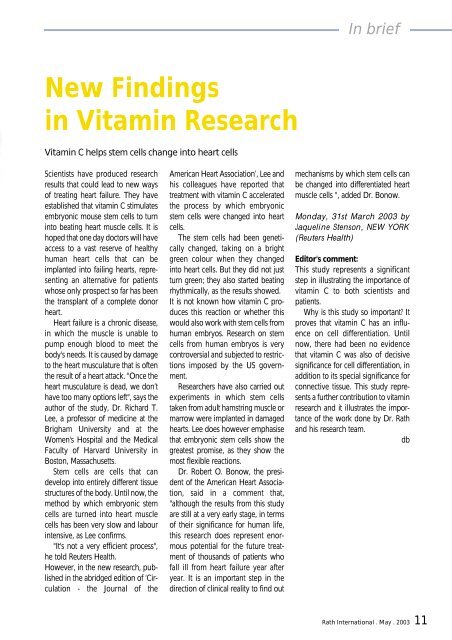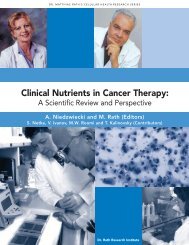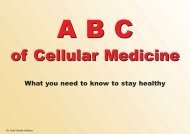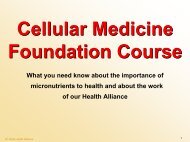News - Dr. Rath Health Alliance
News - Dr. Rath Health Alliance
News - Dr. Rath Health Alliance
Create successful ePaper yourself
Turn your PDF publications into a flip-book with our unique Google optimized e-Paper software.
New Findings<br />
in Vitamin Research<br />
Vitamin C helps stem cells change into heart cells<br />
Scientists have produced research<br />
results that could lead to new ways<br />
of treating heart failure. They have<br />
established that vitamin C stimulates<br />
embryonic mouse stem cells to turn<br />
into beating heart muscle cells. It is<br />
hoped that one day doctors will have<br />
access to a vast reserve of healthy<br />
human heart cells that can be<br />
implanted into failing hearts, representing<br />
an alternative for patients<br />
whose only prospect so far has been<br />
the transplant of a complete donor<br />
heart.<br />
Heart failure is a chronic disease,<br />
in which the muscle is unable to<br />
pump enough blood to meet the<br />
body's needs. It is caused by damage<br />
to the heart musculature that is often<br />
the result of a heart attack. "Once the<br />
heart musculature is dead, we don’t<br />
have too many options left", says the<br />
author of the study, <strong>Dr</strong>. Richard T.<br />
Lee, a professor of medicine at the<br />
Brigham University and at the<br />
Women's Hospital and the Medical<br />
Faculty of Harvard University in<br />
Boston, Massachusetts.<br />
Stem cells are cells that can<br />
develop into entirely different tissue<br />
structures of the body. Until now, the<br />
method by which embryonic stem<br />
cells are turned into heart muscle<br />
cells has been very slow and labour<br />
intensive, as Lee confirms.<br />
"It's not a very efficient process",<br />
he told Reuters <strong>Health</strong>.<br />
However, in the new research, published<br />
in the abridged edition of ‘Circulation<br />
- the Journal of the<br />
American Heart Association’, Lee and<br />
his colleagues have reported that<br />
treatment with vitamin C accelerated<br />
the process by which embryonic<br />
stem cells were changed into heart<br />
cells.<br />
The stem cells had been genetically<br />
changed, taking on a bright<br />
green colour when they changed<br />
into heart cells. But they did not just<br />
turn green; they also started beating<br />
rhythmically, as the results showed.<br />
It is not known how vitamin C produces<br />
this reaction or whether this<br />
would also work with stem cells from<br />
human embryos. Research on stem<br />
cells from human embryos is very<br />
controversial and subjected to restrictions<br />
imposed by the US government.<br />
Researchers have also carried out<br />
experiments in which stem cells<br />
taken from adult hamstring muscle or<br />
marrow were implanted in damaged<br />
hearts. Lee does however emphasise<br />
that embryonic stem cells show the<br />
greatest promise, as they show the<br />
most flexible reactions.<br />
<strong>Dr</strong>. Robert O. Bonow, the president<br />
of the American Heart Association,<br />
said in a comment that,<br />
"although the results from this study<br />
are still at a very early stage, in terms<br />
of their significance for human life,<br />
this research does represent enormous<br />
potential for the future treatment<br />
of thousands of patients who<br />
fall ill from heart failure year after<br />
year. It is an important step in the<br />
direction of clinical reality to find out<br />
In brief<br />
mechanisms by which stem cells can<br />
be changed into differentiated heart<br />
muscle cells ", added <strong>Dr</strong>. Bonow.<br />
Monday, 31st March 2003 by<br />
Jaqueline Stenson, NEW YORK<br />
(Reuters <strong>Health</strong>)<br />
Editor's comment:<br />
This study represents a significant<br />
step in illustrating the importance of<br />
vitamin C to both scientists and<br />
patients.<br />
Why is this study so important? It<br />
proves that vitamin C has an influence<br />
on cell differentiation. Until<br />
now, there had been no evidence<br />
that vitamin C was also of decisive<br />
significance for cell differentiation, in<br />
addition to its special significance for<br />
connective tissue. This study represents<br />
a further contribution to vitamin<br />
research and it illustrates the importance<br />
of the work done by <strong>Dr</strong>. <strong>Rath</strong><br />
and his research team.<br />
db<br />
<strong>Rath</strong> International . May . 2003 11









